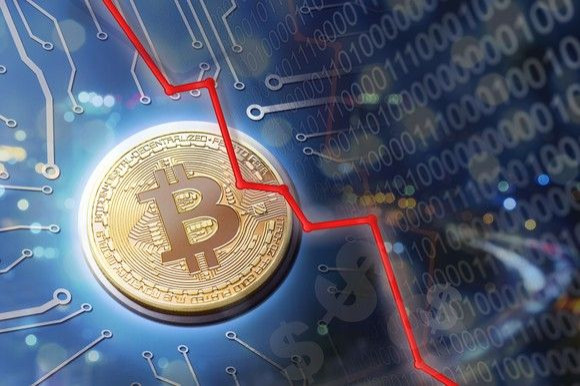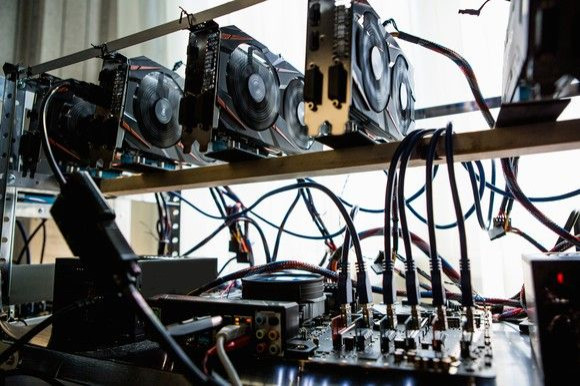Are Cryptocurrency Miners Losing Money On Bitcoin?

This article originally appeared in the Motley Fool.
Last year was truly a marvel for cryptocurrency investors. Despite some wild volatility, the aggregate market value of digital currencies soared by almost $600 billion, representing an increase of more than 3,300%. It's possible we'll never see an asset class gain this much in a single year's time for as long as we live.
However, 2018 has been a different story. Increased regulation in key markets, such as South Korea, along with recent announcements from Facebook and Alphabet subsidiary Google that cryptocurrency and initial coin offering ads would be banned, has created quite a stir. As of this past Saturday, the aggregate cryptocurrency market cap had sunk as low as $300 billion. Mind you, it was $835 billion on Jan. 7 and $519 billion on Feb. 17.
The Recent Plunge In Cryptocurrency Prices Is Likely Impacting Mining Margins
The latest dive in virtual currencies has pretty much impacted investors across the board, but it may also be significantly influencing what's going on behind the scenes for cryptocurrency miners.
For those of you who are unfamiliar with the concept of "mining," it merely describes the process by which transactions on a blockchain network --blockchain being the digital and decentralized ledger where transactions are recorded -- are validated. Mining itself involves individuals or businesses using high-powered computers to solve complex mathematical equations that are the result of the encryption associated with logging transactions on the digital ledger. These miners are competing with one another to be the first to solve equations within a "block," or group of transactions. The first to do so, and in the process validate a group of transactions and add their block to the ever-increasing blockchain, receives what's known as a "block reward." Block rewards are paid out as digital tokens of the currency that's being validated.
While we often think of investors when cryptocurrencies pop and plunge, cryptocurrency miners are affected as well. Mining costs, such as the need to buy hardware to mine (e.g., graphics processing units or application-specific integrated circuit (ASIC) chips), electricity costs, and potentially cooling costs (these machines generate a lot of heat), tend to be somewhat range-bound. Meanwhile, cryptocurrency prices, which will determine the aggregate value of the block reward, are extremely volatile. If the price of a digital token is falling, the margin that miners might receive is almost assuredly shrinking as well.
But could this recent decline in cryptocurrencies actually be causing some miners to lose money? A new report suggests so.
Are Bitcoin Miners Losing Money?
As reported by CNBC this past week, Thomas Lee of Fundstrat and his team used a three-factor method to calculate out a breakeven mining cost for bitcoin of $8,038 per token. For reference, bitcoin was trading $200 below this breakeven estimate as of Saturday, March 17. The three factors examined were equipment costs, electricity costs (at $0.06/kWh), and cooling costs.
Interestingly enough, equipment costs are noted by Fundstrat as the leading expense for miners, not electricity costs as many would presume. ASIC chips (the only option for mining bitcoin) can be considerably more costly than traditional graphics processing units, and technology these days becomes obsolete in a matter of months, not years, requiring miners to constantly upgrade their equipment to compete against other individuals and mining farms. In other words, according to at least this one cost model, the average bitcoin miner might be losing money right now.
However, what the model doesn't take into account are the wide variances in electricity costs around the world. China, for example, has an electricity cost that's 33% lower than what Fundstrat used in its modeling. This is what's encouraged four of the five largest bitcoin mining farms in the world to set up shop in China. It's also been the impetus behind China's push to curb electricity to mining farms, which can be a drain on electricity grids.
A number of other countries, including Venezuela, Sweden, and Denmark, have reasonably low electricity costs that would encourage bitcoin miners to open up shop. Thus, while bitcoin mining may be unprofitable in far more countries than it's been in months, the majority of tokens being mined today, even with bitcoin down more than 60% from its December 2017 high, are still likely to be profitable.
What Happens If Bitcoin Mining Is Unprofitable?
What the recent drop in bitcoin's price has once again done is raise a common theoretical question that no one decisively knows the answer to: What happens if bitcoin mining becomes unprofitable?
For mining to be broadly unprofitable, the price of bitcoin would need to collapse significantly more than it already has. According to a model created by Elite Fixtures, which primarily focused on electricity costs in 115 countries, mining bitcoin in China might still be profitable if the token shed another 50% from where it currently trades. CNBC notes that Chinese bitcoin miners are incentivized to mine at practically any cost or price since it allows them to send their block rewards overseas in order to evade the government's capital controls. This alone would suggest that even if bitcoin mining becomes unprofitable, quite a few of the larger farms in China would remain in place to validate transactions.
There's also a strong likelihood that if other miners were to drop out of the bitcoin mining pool, it would reduce the difficulty in mining bitcoin, making it profitable (although marginally) for those that remain. This pendulum effect of difficulty is a control mechanism for bitcoin mining margins.
The downside? If bitcoin prices keep falling, and the incentive to mine for those people and firms outside of China is reduced, it's always possible that block processing times could increase from where they are today at around 10 minutes. Bitcoin's blockchain isn't particularly fast compared to its peers, and becoming even slower if miners leave the network could be a problem.
Again, no one knows the answer to this question of "what happens to bitcoin if mining it is unprofitable" with any certainty, but my belief is we'd see bitcoin (and some of its miners) live on, albeit with slower processing times.
Suzanne Frey, an executive at Alphabet, is a member of The Motley Fool's board of directors. Sean Williamshas no position in any of the stocks or cryptocurrencies mentioned. The Motley Fool owns shares of and recommends Alphabet (A shares), Alphabet (C shares), and Facebook, but has no position in any cryptocurrencies mentioned. The Motley Fool has a disclosure policy.





















